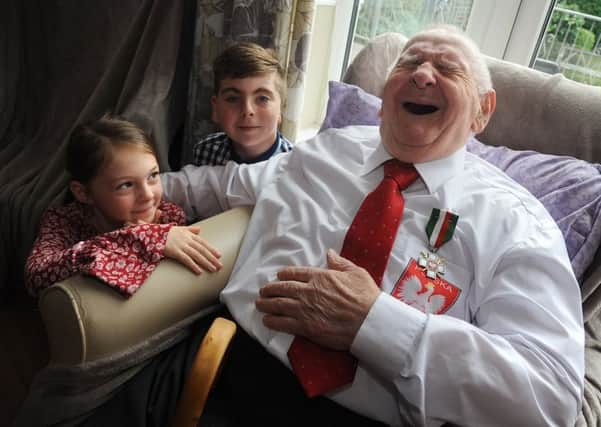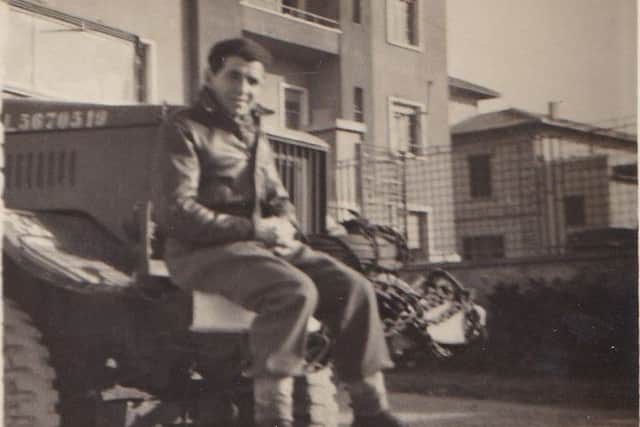Medal honour for man who survived Soviet labour camp and fought for Allied troops in World War II


Aleksander Chodasiewicz, 99, survived for 18 months in horrendous conditions after being deported at the start of the war, and went on to fight alongside British, French, and other Allied troops.
He was presented with the Siberia Cross by the Polish government in honour of his ‘martyrdom and ideas of freedom and independence’ at the Rossendale Nursing Home in Ansdell, where he lives, on Thursday.
Aleksander was born in Poland on July 12 1919.


Advertisement
Hide AdAdvertisement
Hide AdFollowing the signing of the German-Soviet Non-aggression Pact in 1939, the Soviet Union invaded Poland from the east, 16 days after Germany invaded from the west.
Between 6,000 and 7,000 Polish soldiers died in the fighting, and hundreds of thousands of Polish citizens were captured.
By the time German-Soviet alliance was broken in 1941, the Soviets had arrested and imprisoned about 500,000 Polish people, including civic officials, military personnel, and ‘enemies of the people’ such as the clergy, teachers, and one in 10 of all adult males.
Aleksander, who was just 20-years-old at the time and worked as a chauffeur, was given just 30 minutes to say his goodbyes when the Soviet NKVD came to take him away in 1940.
Advertisement
Hide AdAdvertisement
Hide AdHis two brothers hid while he was taken to a nearby railway station and put on a goods wagon headed for Siberia.
His son Stan Chodasiewicz, 67, said: “This was the last time he saw his family. He has spoken about being in a goods wagon for days as the train made its way into Siberia. When this journey ended they were out in the countryside in harsh winter conditions.
“The first job the prisoners had to do was to cut down trees in order build accommodation blocks.”
Following the German invasion of the Soviet Union in June 1941, the Soviets repatriated some 100,000 Poles who had been imprisoned, including Aleksander.
Advertisement
Hide AdAdvertisement
Hide AdThey formed a 75,000 strong army, under General Władysław Anders, and fought alongside the allies.
As a 2nd lieutenant Aleksander saw action in Egypt and fought in the The Battle of Monte Cassino, in Italy.
He came to the UK in 1946 and settled in Kirkham, where he married his wife, Ann, 93, in 1950, and had four children: Stan, Lawrence, Ann Marie and Krysia.
He has five grandchildren and two great-grandchildren.
Stan said: “He never talked about it with the family. I found out more through listening to friends than through him. As for his time in Siberia, he never mentioned it.
Advertisement
Hide AdAdvertisement
Hide Ad“He went through a really bad experience and he didn’t want his family to know how terrible it was. If you go through something like that, you don’t want to talk about it.”
For years Aleksander believed his family had perished during the war, but was contacted by a distant cousin in the 1970s who told him his brother, Bogdhan, had survived and was living in Belarus. The two were able to meet several times before Bogdhan’s death in 1979.
Aleksander, who has lived in care for three years, used to work for Courtaulds fabric and clothing manufacturers until his retirement in 1984. He was an active member of the British Legion and carried with Polish standard in local parades.
He was diagnosed with dementia when he was 94.
He speaks both Polish and English, and stills knows the Polish national anthem by heart.
Advertisement
Hide AdAdvertisement
Hide AdPresenting him with his medal, Consul General of the Republic of Poland Leszek Rowicki said: “It is a great pleasure for me to decorate Mr Chodasiewicz with this Siberia Cross.”
Krysia, 55, said: “He has always been very family-orientated. He has always been a family man devoted to bringing up his children.
“He has worked really hard all his life. Coming over to England with nothing, he’s quite a gregarious man.
“He still had strong ties with the Polish community all his life, and was involved in Polish clubs and the Polish church in Preston.
Advertisement
Hide AdAdvertisement
Hide Ad“If he could understand what it was about he would be the proudest Polish-English man in the universe. He has always been proud of his Polish upbringing and the fact that he came here and he felt that he had done well for himself.
“He would have been very proud of himself, as we all are. He is really enjoying the moment and it’s lovely for us all to be able to be here with him and celebrate.”
Stan said: “Although England has been where he chose to make his home after the Second World War, he is still very proud to accept this medal from the country of his birth.
“The Siberian Cross is awarded in recognition of what many thousands of Poles suffered in the early 1940s and the hardships they endured. We will never fully understand their suffering or the impact of those experiences. He must have been incredibly brave but he was always most proud of being a dad.”